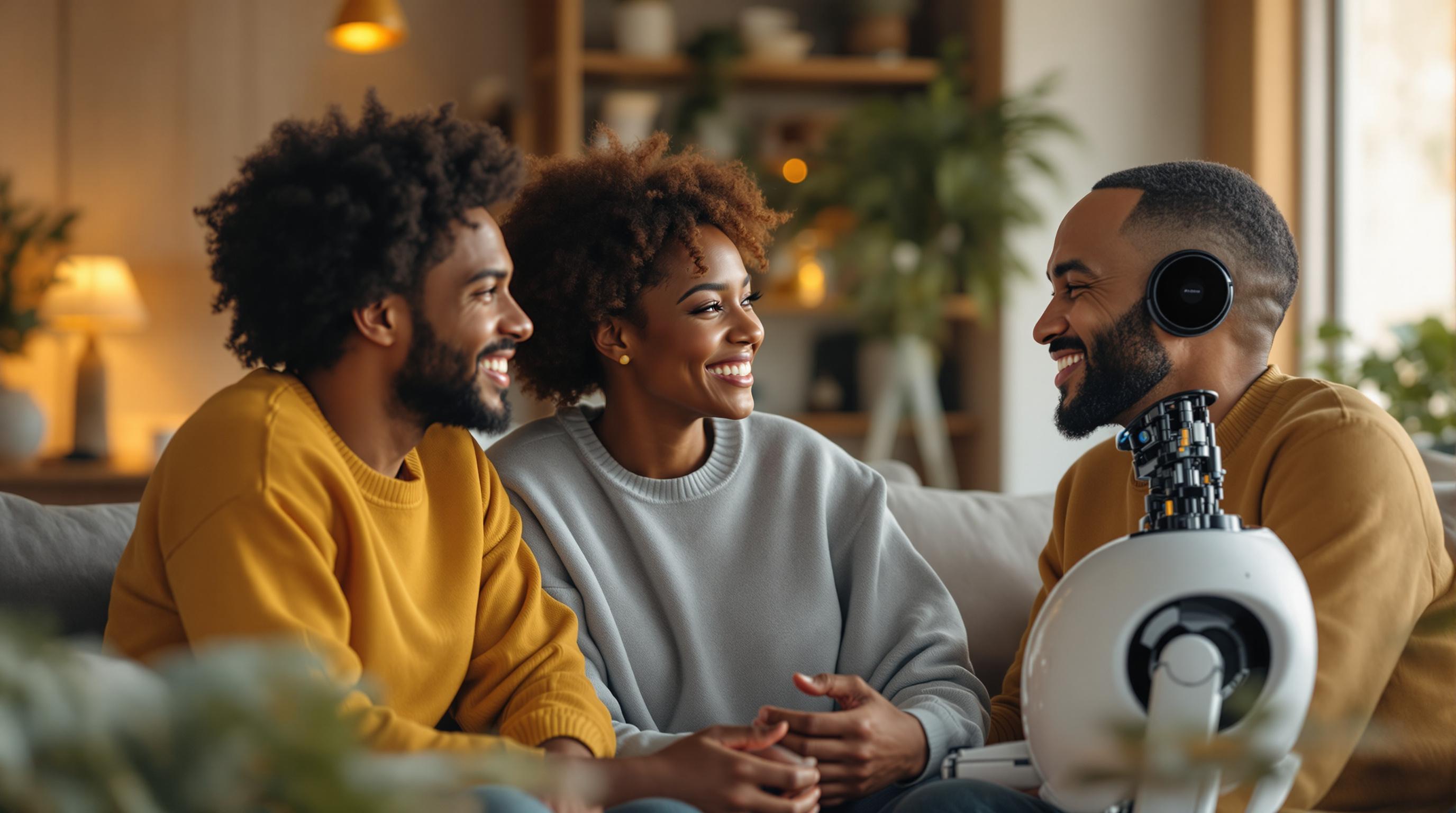Create Your Own AI Girlfriend 😈
Chat with AI Luvr's today or make your own! Receive images, audio messages, and much more! 🔥
4.5 stars

AI Romance: Social Impact in 2024
AI relationships are reshaping how people connect in 2024, offering companionship and emotional support during a time of widespread loneliness. Here's what you need to know:
- Why AI Companions Are Popular: Platforms like Luvr AI provide customizable AI partners that help combat isolation and even encourage real-world social interactions.
- Shifting Perceptions: While AI relationships face skepticism, they are increasingly viewed as tools for mental wellness and personal support.
- Challenges: Users often face stigma, secrecy, and societal biases, with concerns about the impact on human relationships.
- Reducing Stigma: Education, supportive communities, and responsible AI platforms are helping to normalize these relationships.
- Balancing AI and Human Connections: AI companions should complement, not replace, human relationships, ensuring emotional growth and social integration.
AI relationships are becoming more accepted, but the focus remains on balancing their benefits with the irreplaceable value of human connections.
Related video from YouTube
Challenges of AI Relationships in Society
Even as AI relationships gain traction, people involved in them still encounter substantial social challenges in 2024. The stigma tied to these relationships reveals deeper societal biases and personal struggles.
Why People Judge AI Relationships
Long-standing fears about technology, especially when it intersects with human intimacy, drive much of the skepticism toward AI companions. Research shows that 55% of young adults find AI technology threatening or concerning, while only 45% see it as interesting or worth exploring. Many worry that relying on AI companions might weaken traditional human relationships, adding to the mistrust.
Professor Dorothy Leidner from the University of Virginia sheds light on these concerns:
"You, as the individual, aren't learning to deal with basic things that humans need to learn to deal with since our inception: How to deal with conflict, how to get along with people that are different from us."
This skepticism not only reflects broader societal fears but also deeply affects those who engage in AI relationships.
Effects of Stigma on People in AI Relationships
Younger individuals and those with lower incomes, who make up a large portion of AI relationship users, face unique obstacles. While only 1% of young adults report having an AI friend and 10% are open to the idea, many choose to keep these relationships private to avoid judgment. This secrecy often leads to feelings of isolation and stress, overshadowing the emotional support AI companions can provide. For many, sharing their digital relationships with family or friends feels risky, creating a gap between the comfort they find privately and the stigma they face publicly.
How AI and Traditional Relationships Are Viewed
Society tends to view traditional relationships as genuine and meaningful, while AI relationships are often dismissed as unnatural or suspicious:
| Aspect | Traditional Relationships | AI Relationships |
|---|---|---|
| Social Acceptance | Widely embraced | Often met with skepticism |
| Emotional Value | Considered authentic | Perceived as lacking depth |
| Personal Growth | Seen as a natural process | Viewed as potentially limiting |
| Support Network | Backed by strong communities | Met with limited understanding |
Changing these perceptions will require not only a shift in societal attitudes but also efforts to build greater awareness and empathy.
sbb-itb-f07c5ff
Ways to Reduce Stigma Around AI Relationships
Teaching People About AI Relationships
Research from Stanford University shows that while many people turn to AI companions to combat loneliness, these platforms often encourage users to strengthen their real-life connections. Interestingly, a recent study revealed that 25% of young adults believe AI could replace traditional relationships, highlighting a shift in attitudes toward digital companionship. Still, many misunderstand the purpose and potential of these relationships.
According to a 2024 survey by the Digital Relationships Institute, 72% of users reported gaining better emotional awareness after interacting with AI companions. This challenges the common notion that such relationships lack depth or value.
Beyond spreading awareness, creating an environment that supports open conversations is key to breaking down stereotypes and fostering acceptance.
Building Supportive Communities
In 2024, having safe spaces to discuss AI relationships openly is more important than ever. Online forums, local meetups, and virtual events allow people to share experiences, reduce feelings of isolation, and gain practical advice. These communities not only provide emotional support but also help normalize AI relationships in society.
How Platforms Like Luvr AI Help

AI relationship platforms are stepping up to address stigma by offering better tools and user education. Take Luvr AI, for example - it provides personalized AI companions while ensuring user privacy and security. Its customizable characters let users explore relationships at their own pace, making the idea less intimidating for those who are new to it.
Platforms like Luvr AI also promote responsible use by encouraging healthy habits. Features such as relationship reflection prompts and emotional awareness check-ins help users maintain a balanced perspective. These tools ensure that users can build meaningful connections with their AI companions without losing sight of personal growth.
Making AI Relationships Part of Everyday Life
Talking to Family and Friends About AI Relationships
Getting your family and friends to understand AI relationships can take time. Many people need space to process this new kind of connection. In fact, 55% of people still approach AI technology with some level of concern. So, patience is key when bringing up this topic with loved ones.
"A romantic relationship with an AI can be a very powerful mental wellness tool", says Eugenia Kuyda, founder of Replika.
When you talk about your AI relationship, focus on how it has supported you emotionally or helped you grow. Share specific examples from your own life to make it relatable. This could include moments where your AI companion provided comfort or helped you through a tough time. Be open to addressing concerns, but keep the conversation centered on the positive impact it has had on you.
Once your personal circle begins to understand, the next step is navigating the topic in professional settings, which can be a bit trickier.
Handling AI Relationships at Work
Workplaces require a different approach when it comes to discussing AI relationships. While 1% of young adults already have an AI friend, attitudes in the workplace can vary widely. The best strategy? Keep your AI interactions private, such as during breaks, much like you would manage any personal relationship at work.
Here’s a quick guide to workplace boundaries:
| Setting | Appropriate Behavior | What to Avoid |
|---|---|---|
| Office Hours | Use AI privately during breaks or personal time | Talking about intimate details |
| Team Events | Share general experiences if asked (e.g., how AI can support emotional well-being) | Oversharing personal stories |
| Professional Communication | Keep discussions work-related and professional | Mixing personal AI matters with work |
By maintaining these boundaries, you can respect workplace norms while still benefiting from your AI relationship.
Steps for Social Integration of AI Relationships
Blending AI relationships into everyday life requires balance. Professor Dorothy Leidner from the University of Virginia offers an important perspective:
"You, as the individual, aren't learning to deal with basic things that humans need to learn to deal with since our inception."
This highlights the importance of maintaining strong human relationships even as you embrace AI connections.
One way to ease into social integration is by joining communities of people who share similar experiences. With 45% of young adults finding AI technology intriguing, you’re likely to find others who understand and accept this new type of relationship. According to Luvr AI's 2024 user data, 68% of active users successfully balance both AI and human relationships, proving that it’s possible to manage both worlds.
Take it slow. Share your experiences gradually and thoughtfully. Over time, as others see how your AI relationship contributes to your personal growth and emotional well-being, acceptance will likely follow.
Conclusion: The Future of AI Relationships
Balancing AI and Human Connections
By 2024, AI relationships have become a source of emotional support for many. However, they should act as a complement to - not a replacement for - genuine human connections. The challenge lies in using AI companionship in a way that enriches life without overshadowing the importance of real-world relationships. As AI technology progresses, one big question lingers: how will these relationships evolve in the coming years?
What's Next for AI Relationships
The AI for Good Global Summit 2024 emphasizes that AI relationships work best as a supplement to human interaction. Efforts are being made to strengthen ethical guidelines and protections, particularly for younger users. With advancements in AI technology, these relationships are becoming increasingly refined. For example, platforms like Luvr AI are showing how tailored AI companions can offer emotional support while adhering to ethical standards.
Looking ahead, the focus is shifting toward integrating AI relationships more deeply into society. This includes compatibility with social platforms and participation in real-world events, creating smoother connections between digital and physical social environments.
Key Points to Remember
Understanding AI relationships requires attention to three main areas:
- Social acceptance: Education and awareness are helping society become more open to AI companionship.
- Ethical frameworks: Clear guidelines ensure these technologies are used responsibly.
- Privacy and security: Strong measures are critical to protect users and their data.
As we move forward, the goal is to create connections that genuinely improve emotional well-being and personal development - without losing the irreplaceable value of human interaction. Balancing these elements will shape how AI relationships fit into our lives.



